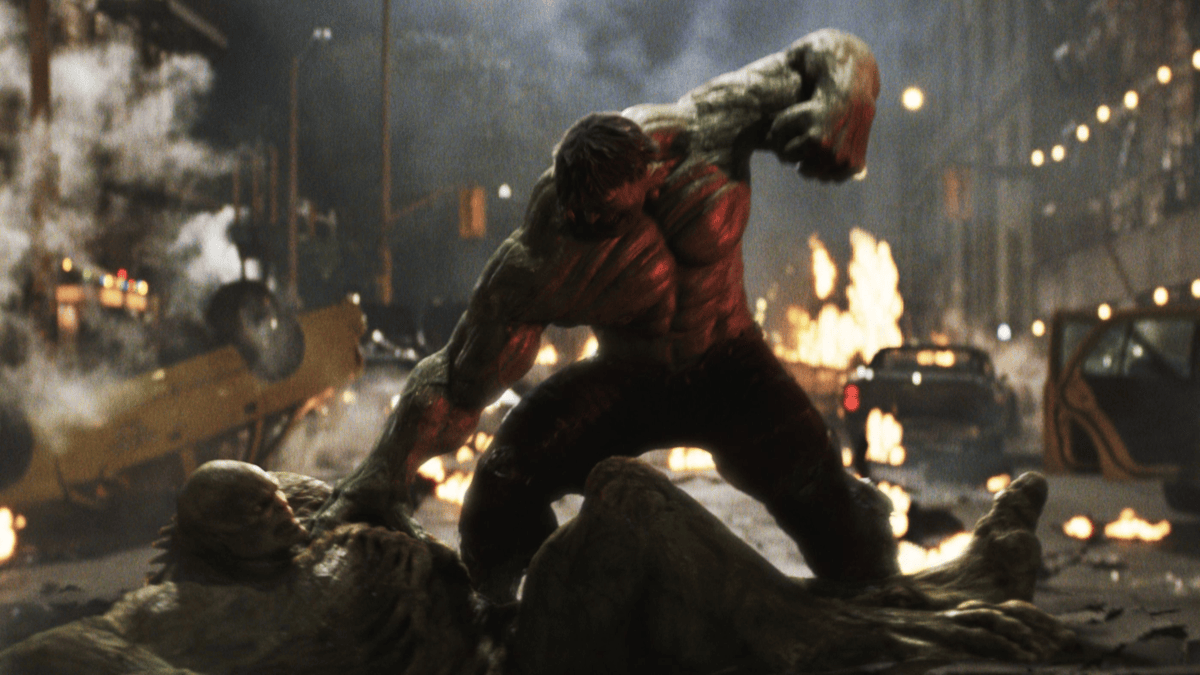Director: Louis Leterrier
Writer: Zak Penn
Stars: Edward Norton, Liv Tyler, Tim Roth
Synopsis: Bruce Banner, a scientist on the run from the U.S. Government, must find a cure for the monster he turns into whenever he loses his temper.
With the release of Captain America: Brave New World, Marvel Studios has seemingly doubled (tripled, quadrupled?) down on their mechanical, sterilized output of content. The only difference between this one and the lazy dozen is that critics have stopped cutting the studio slack. No longer can the MCU get a pass on name alone, and Brave New World’s lukewarm reception, and subsequent box office drop-off, is the steely proof in the adamantium pudding.

What does it look like when Marvel has to earn it — positive reception, numbers, performance? While we may find out how that looks nowadays this summer, given the release of Thunderbolts and The Fantastic Four: First Steps, we already know how it looked in the universe’s infancy.
Enter: The Incredible Hulk. Released just months after the smash-hit that was Iron Man in 2008, Louis Leterrier’s Bruce Banner blockbuster was poised to be Marvel’s second score of that year… until it wasn’t. Critics and audiences alike shrugged at the arrival of the new Hulk. Edward Norton’s lead performance was criticized, the film was lambasted for its loose adaptation of the source material, and, in the end, many folks left the theater with the lone highlight of Tony Stark’s post-credits appearance held close to their chests.
After that? Well, you know the rest. No more dedicated Hulk movies, Norton is recast, and the film is basically forgotten about. That is, until the new Captain America movie operates as a one-to-one, direct sequel. Brave New World is, without exaggeration, The Incredible Hulk 2… only, minus the Hulk himself.
That movie and the many head-scratching questions that come with it aside, what made The Incredible Hulk worth resurrecting? To me, it seems, critics aren’t the only ones growing tired of Marvel’s modern irrelevancy. The studio themselves are digging up the past in as many manners as are possible, including touching base with the least successful film in their franchise. Because, after all, it seems, that movie is more than what meets the eye.
For starters, there’s something to be said about a movie like this one that commits itself to the aesthetic of its mascot; everything is green. Green soda, green chemicals, green scopes, green vehicles, and, of course, green monsters. The rest of the film’s palette is sharp and saturated; shadows possess characters on more than one occasion, their movements defined by motivations. It’s been said that the eyes are a window to the soul, but you’d be surprised what splaying a soul out in one hazy color does for a character.

On a broader note, the cinematography and cosmetics are perhaps The Incredible Hulk’s greatest strength, and that isn’t necessarily a bad thing. It’s a movie with stylistic identity, the likes of which hasn’t been seen in the MCU in a long time, outside of Gunn’s Guardians entries.
My mind goes specifically to the final fight between Hulk and Abomination, which is ironically often cited as a problem for the film. But to play the comparison game once more, watching Abomination tear through a busy street, trying to get to the Hulk, while droves of citizens run for their lives from flying cars and giant pieces of makeshift shrapnel… it simply hits with abundant impact.
Not to mention the fact that the also often criticized special effects in this sequence are actually quite impressive. For as much mayhem is being depicted on screen, it all comes together with surprising ease. Leterrier has a penchant for grounded, gritty, sweaty aesthetics, and his treatment of the hulking monsters fits right into that. You can hardly see Hulk’s expression through his matted hair, and Abomination is difficult to look at, point blank period, due to his grotesque mutations and admitted fear-factor.
The Incredible Hulk looks excellent on multiple levels, and it looks singular — a value the cinematic universe in which it takes place has since abandoned.
Where the film does falter, unfortunately, is where it was always bound to: the story. It’s no secret that the higher-ups at Marvel had their way with this cut, given the extensive deleted scenes that were chopped off both ends of Leterrier’s original vision (many of which you can find online.) So, not only does the plot end up hackneyed, but the edit does, too. There’s an odd, discombobulating pace to it all; chunks of background and development, though once clearly present, are now only specters. Translucent images left behind by something that was supposed to be, should’ve been, here.
It’s both blunt and overcrowded. Despite a sub-two hour runtime, you’ve got two, arguably three villains and operating protagonists across the board. The Leader, Samuel Sterns (Tim Blake Nelson) gets especially stiffed in being both wholly unlike his comic book counterpart and also only physically present in the final act. The note on which he goes out is a perfect summation of this story’s struggles: confusing, and laughably sudden.

Story beats sound off in sporadic fashion, especially in regards to the aforementioned evildoers and their motivations. Bruce’s narrative momentum is thankfully a bit clearer, if not a tad sparse. Funnily enough, he’s carried by a performance from Norton that is vastly underrated. He brings a calculated unease to the character that was, I believe, lost in subsequent renditions. And it goes without saying that Liv Tyler’s Betty Ross is brilliant as well. The two combine for one of the better lead pairs in the MCU, insofar as they present a believable, flawed relationship with jagged edges and cut corners.
That rings true of the entire movie. Jagged edges, cut corners, missed opportunities, yet somehow still charming and, in the end, workable. Much can be said back and forth about The Incredible Hulk, but given the current state of Marvel’s infamous cinematic universe, I find value in accepting it as a flawed piece of blockbuster cinema that represents the past.
A past that we took for granted, at that. If it’s been a while since you’ve thrown this one on, it may be worth spinning once more. If you plan to see Brave New World you’ll have to anyway, although be warned: as messy as both movies are, watching them back to back may leave you with an insatiable nostalgia for a sort of superhero filmmaking gone by. As for me, I’ll take this impassioned plight any day.





